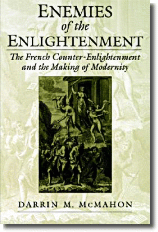I asked Darrin to apply the "page 69 test" to his latest book; this is what he reported:
Happiness: A History, as the title suggests, is a book about the history of happiness. I see happiness above all as an alluring idea that has exercised a particularly strong hold on the Western imagination. Rather than try to define what happiness isThanks to Darrin for the input.once and for all—or give advice about how to get it!—I look at the way different periods have imagined happiness though the ages and how these changing conceptions bear on our own contemporary quest for this elusive end.
Page 69 falls at the very beginning of Chapter Two. In the Introduction and Chapter One I introduced the “tragic” understanding of happiness—common to many early cultures—that sees happiness primarily as a function of fortune or the benevolence of the gods. (We retain something of this link in the word “happiness” itself, whose root is “hap,” meaning luck or fortune). I also discussed how the Greeks, beginning with Socrates, challenged that idea, developing an understanding of happiness as the reward for living a virtuous life.
The bulk of Chapter Two is devoted to how Christianity both rejected and adapted these earlier notions. But I also talk about some of the earthier Roman conceptions of happiness against which Christians rebelled. Page 69 features a picture of a Roman coin with the Emperor Vespasian on one side and the goddess Felicitas (Felicity) on the other—a common pairing. Holding a horn of plenty, Felicitas represents bounty, and so symbolizes perfectly the popular Roman conception that to be happy is to be prosperous, and to be “poor” (miser) is to be miserable. The previous page shows an amusing picture of a great Roman phallus, with the straightforward inscription: Hic habitat felicitas. “Here dwells felicity!” Needless to say, Christians would have a field day with all this.
So page 69 is only a snapshot in a long-developing sequence. But in so far as it presents notions of happiness—happiness as pleasure and prosperity, happiness as good living, and ultimately happiness as spiritual fulfillment—that continue to be part of our modern understanding, the page is representative of the book as a whole. For my greatest concern in this book is to show how our past pursuits continue to shape those of the present.
There is an excerpt available from the publisher (sorry, no direct link: it involves a little searching), or you may click here.
Before last New Years Eve, Darrin previewed a theme from his book in an essay titled, "In Pursuit of Unhappiness." Click here to read it.
Curious about what the writers of the Declaration of Independence meant by the "pursuit of happiness" but can't wait to get your hands on McMahon's book? Click here for a quick lesson.

Happiness: A History earned fine reviews from a number of publications including the Economist and, by Jim Holt, in the New York Times.
Diane Rehm interviewed Darrin about the book; click here to listen to their conversation. Michael Krasny also conducted an interview: click here to listen to it.
Click here to learn more about Enemies of Enlightenment.
Darrin M. McMahon is a regular contributor to The New Republic's Open University blog, where he is joined by previous "page 69" contributors Cass Sunstein (Infotopia), David Greenberg (Nixon's Shadow), Alan Wolfe (Does American Democracy Still Work?), Eric Rauchway (Blessed Among Nations), and others.
Previous "page 69 tests":
Leo Braudy, From Chivalry to Terrorism
David Nasaw, Andrew Carnegie
Leah Hager Cohen, Train Go Sorry
Chris Grabenstein, Slay Ride
David Helvarg, Blue Frontier
Marina Warner, Phantasmagoria
Bill Crider, A Mammoth Murder
Robert W. Bennett, Taming the Electoral College
Nicholas Stern et al, Stern Review Report
Kerry Emanuel, Divine Wind
Adam Langer, The Washington Story
Michael Scott Moore, Too Much of Nothing
Frank Schaeffer, Baby Jack
Wyn Cooper, Postcards from the Interior
Ivan Goncharov, Oblomov
Maureen Ogle, Ambitious Brew
Cass Sunstein, Infotopia
Paul W. Kahn, Out of Eden
Paul Lewis, Cracking Up
Pagan Kennedy, Confessions of a Memory Eater
David Greenberg, Nixon's Shadow
Duane Swierczynski, The Wheelman
George Levine, Darwin Loves You
John Barlow, Intoxicated
Alicia Steimberg, The Rainforest
Alan Wolfe, Does American Democracy Still Work?
John Dickerson, On Her Trail
Marcus Sakey, The Blade Itself
Randy Boyagoda, Governor of the Northern Province
John Gittings, The Changing Face of China
Rachel Kadish, Tolstoy Lied
Eric Rauchway, Blessed Among Nations
Tim Brookes, Guitar and other books
Ruth Padel, Tigers in Red Weather
William Haywood Henderson, Augusta Locke
Jed Horne, Breach of Faith
Robert Greer, The Fourth Perspective
David Plotz, The Genius Factory
Michael Allen Dymmoch, White Tiger
Patrick Thaddeus Jackson, Civilizing the Enemy
Tom Lutz, Doing Nothing
Libby Fischer Hellmann, A Shot To Die For
Nelson Algren, The Man With the Golden Arm
Bob Harris, Prisoner of Trebekistan
Elaine Flinn, Deadly Collection
Louise Welsh, The Bullet Trick
Gregg Hurwitz, Last Shot
Martha Powers, Death Angel
N.M. Kelby, Whale Season
Mario Acevedo, The Nymphos of Rocky Flats
Dominic Smith, The Mercury Visions of Louis Daguerre
Simon Blackburn, Lust
Linda L. Richards, Calculated Loss
Kevin Guilfoile, Cast of Shadows
Ronlyn Domingue, The Mercy of Thin Air
Shari Caudron, Who Are You People?
Marisha Pessl, Special Topics in Calamity Physics
John Sutherland, How to Read a Novel
Steven Miles, Oath Betrayed
Alan Brown, Audrey Hepburn's Neck
Richard Dawkins, The Ancestor's Tale
--Marshal Zeringue





